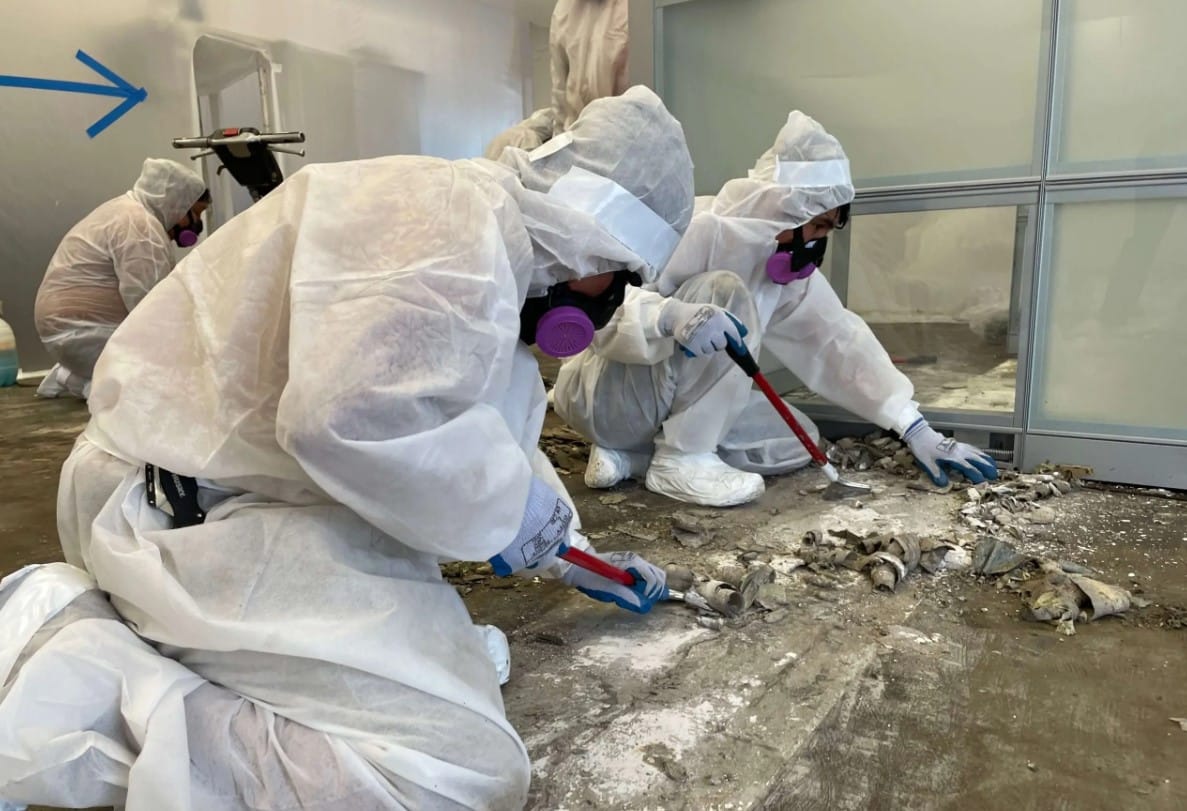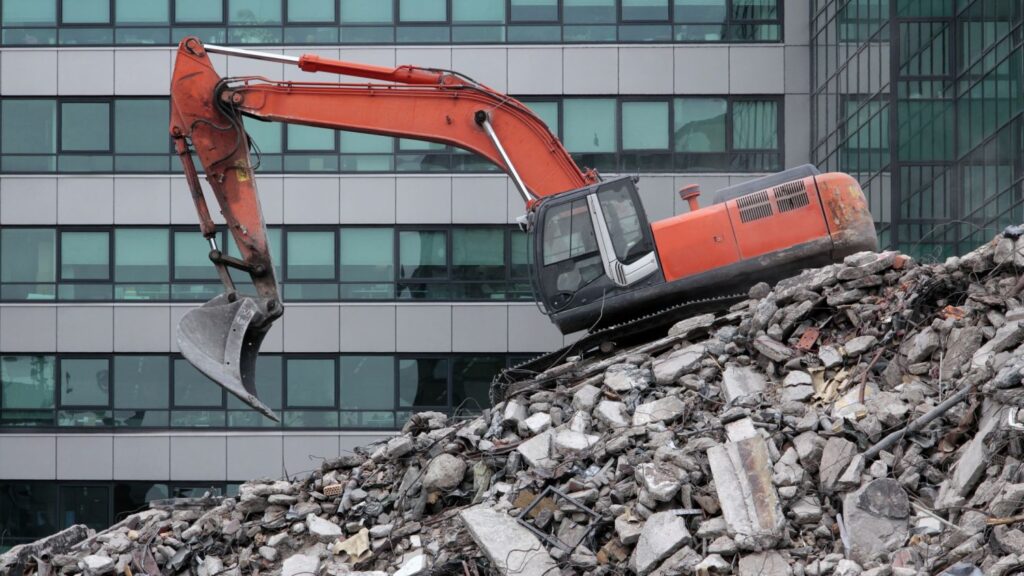- #212 – 4388 Still Creek Dr
- +1 (778) 558-5335
- Send Your Mail At
- info@oldrocky.dcmarketing.ca
- Working Hours
- Mon-Fri:8am To 5.00pm-Sat:9am To 5.00pm

Table of Contents
ToggleWhat is asbestos?
- Asbestos is a group of naturally occurring minerals known for their heat resistance and durability.
- It was widely used in various industries for insulation, fireproofing, and construction materials.
- Asbestos poses serious health risks when its fibers are released into the air and inhaled.
- Exposure to asbestos can cause respiratory diseases such as asbestosis, lung cancer, and mesothelioma.
- Identifying and safely managing asbestos is crucial to protecting human health and the environment.
How do I know if my property contains asbestos?
A professional asbestos inspection and testing can determine the presence of asbestos-containing materials (ACMs).
Certified inspectors conduct visual assessments and collect samples for laboratory analysis.
Common ACMs include insulation, ceiling tiles, floor tiles, and pipe insulation.
Older buildings constructed before the 1980s are more likely to contain asbestos materials.
If you suspect asbestos or plan renovations, it’s best to consult with an experienced asbestos service provider.
Is asbestos dangerous?
- Yes, asbestos is hazardous when its fibers become airborne and are inhaled.
- Prolonged exposure to asbestos fibers can lead to serious respiratory diseases and cancers.
- Asbestos-related diseases have a long latency period, often manifesting years or decades after exposure.
- There is no safe level of asbestos exposure, and even brief exposure can pose health risks.
- Proper management and removal of asbestos are essential to prevent health hazards
Can I remove asbestos myself?
- It is not recommended to remove asbestos yourself due to the associated health risks.
- DIY asbestos removal can disturb fibers and release them into the air, increasing exposure risks.
- Professional asbestos removal companies have the expertise, equipment, and safety protocols to handle asbestos safely.
- Attempting DIY removal may also violate regulations and lead to legal consequences.
- It’s safer and more effective to hire a licensed and certified asbestos removal company for proper abatement
How much does asbestos removal cost?
- The cost of asbestos removal varies depending on factors such as the size of the area, type of asbestos, and accessibility.
- A professional assessment is needed to provide an accurate cost estimate for removal.
- Costs may also include testing, containment, disposal, and post-removal verification.
- While asbestos removal can be expensive, it is a necessary investment in protecting health and safety.
- Rocky Demolition offers competitive pricing and transparent quotes for asbestos removal projects
What are the health risks associated with asbestos exposure?
- Asbestos exposure can lead to serious respiratory conditions such as asbestosis, characterized by scarring of the lung tissue.
- It is also strongly linked to lung cancer, particularly among individuals with prolonged or heavy exposure.
- Mesothelioma, a rare but aggressive cancer affecting the lining of the lungs, abdomen, or heart, is closely associated with asbestos exposure.
- The latency period for asbestos-related diseases can span several decades, making early detection and prevention crucial.
- Avoiding asbestos exposure through proper management and removal is essential for minimizing health risks
How does asbestos testing work?
- Asbestos testing involves collecting samples of suspected materials for laboratory analysis.
- Certified inspectors use specialized equipment and techniques to safely collect samples without releasing fibers into the air.
- Samples are analyzed under a microscope to determine the presence and concentration of asbestos fibers.
- Testing results provide valuable information for assessing asbestos risks and planning appropriate management strategies.
- Rocky Demolition conducts thorough asbestos testing to ensure accurate identification and assessment of asbestos-containing materials.
What is asbestos abatement?
- Asbestos abatement refers to the process of safely removing or encapsulating asbestos-containing materials to reduce exposure risks.
- Abatement methods may include encapsulation, enclosure, or complete removal depending on the condition and location of the asbestos.
- Licensed asbestos abatement contractors follow strict containment and removal procedures to prevent the release of fibers.
- Proper disposal of asbestos waste is an integral part of the abatement process to prevent environmental contamination.
- Rocky Demolition specializes in safe and effective asbestos abatement to protect occupants and workers from exposure risks
Can asbestos be encapsulated instead of removed?
- Yes, encapsulation is a method of containing asbestos fibers within a sealant or coating to prevent their release into the air.
- Encapsulation is often used for asbestos-containing materials that are in good condition and unlikely to be disturbed.
- While encapsulation can provide temporary containment, it may not be a permanent solution and may require periodic monitoring and maintenance.
- Complete removal is typically recommended for damaged or deteriorating asbestos materials to eliminate exposure risks.
- Rocky Demolition can assess whether encapsulation or removal is the most suitable option for managing asbestos hazards in your property
Are there regulations governing asbestos removal?
- Yes, there are strict regulations and guidelines governing the handling, removal, and disposal of asbestos.
- These regulations vary depending on the jurisdiction and may include federal, state, and local requirements.
- Compliance with asbestos regulations is essential to protect the health and safety of workers, occupants, and the environment.
- Licensed asbestos removal contractors must adhere to specific protocols and safety measures outlined in regulatory standards.
- Rocky Demolition ensures full compliance with all applicable asbestos regulations to provide safe and legally sound removal services
What should I do if I suspect asbestos in my home?
- If you suspect asbestos in your home, avoid disturbing the materials and creating dust.
- Contact a licensed asbestos inspector or abatement professional to conduct a thorough assessment.
- Limit access to the area containing suspected asbestos materials to prevent exposure.
- Follow any recommendations provided by the asbestos professional for managing the asbestos safely.
- Consider professional asbestos testing and removal services to address the issue effectively
How long does asbestos removal take?
- The duration of asbestos removal depends on various factors, including the size and complexity of the project.
- Smaller-scale removal projects may take a few days, while larger projects may take weeks to complete.
- Factors such as containment setup, removal methods, and disposal logistics can impact the timeline.
- Rocky Demolition strives to complete asbestos removal projects efficiently without compromising safety or quality.
- We provide transparent timelines and regular updates throughout the removal process to keep clients informed
Is it safe to live in a house with asbestos?
- Asbestos-containing materials that are intact and undisturbed generally pose a lower risk of exposure.
- However, the presence of asbestos in the home can still present health risks over time.
- It is essential to monitor the condition of asbestos materials and take appropriate management measures.
- If renovations or disturbances are planned, professional asbestos assessment and removal may be necessary.
- Rocky Demolition can help assess the risks and provide recommendations for managing asbestos safely in your home
Can asbestos be recycled?
- Asbestos materials cannot be recycled due to their hazardous nature.
- Recycling facilities do not accept materials containing asbestos fibers to prevent exposure risks.
- Proper disposal of asbestos waste is essential to prevent environmental contamination and health hazards.
- Licensed asbestos removal contractors follow specific protocols for packaging and transporting asbestos waste to approved disposal facilities.
- Rocky Demolition ensures the safe and responsible disposal of asbestos waste in compliance with regulatory requirements
Are there alternatives to asbestos?
- Yes, there are alternatives to asbestos for various applications, including insulation and fireproofing.
- Materials such as fiberglass, cellulose, and mineral wool are commonly used as substitutes for asbestos.
- These alternative materials offer similar thermal and acoustic properties without the health risks associated with asbestos.
- Choosing non-asbestos alternatives can help reduce exposure risks and promote safer building practices.
- Rocky Demolition can provide guidance on alternative materials and assist with asbestos-free construction or renovation projects

What is residential demolition?
Residential demolition involves the dismantling or removal of structures such as houses, apartments, or condominiums.
Why would someone need residential demolition services?
Property owners may require residential demolition services to make way for new construction, renovations, or land redevelopment.
How does residential demolition differ from commercial demolition?
Residential demolition focuses on smaller-scale structures intended for residential use, while commercial demolition involves larger buildings used for business or industrial purposes.
What types of structures can be demolished residentially?
Residential demolition can include single-family homes, townhouses, duplexes, and smaller apartment buildings.
Do I need permits for residential demolition?
Yes, permits are typically required for residential demolition to ensure compliance with local building codes and regulations.
How long does residential demolition take?
The duration of residential demolition depends on factors such as the size of the structure and the complexity of the project.
Is residential demolition noisy?
Residential demolition can be noisy due to the use of heavy machinery and equipment for dismantling structures.
Are there any environmental concerns with residential demolition?
Residential demolition may involve the removal of hazardous materials such as asbestos or lead-based paint, which require proper handling and disposal to prevent environmental contamination.
Can I demolish a residential structure myself?
DIY residential demolition is not recommended due to safety concerns and the potential for property damage or injury.
How much does residential demolition cost?
The cost of residential demolition varies depending on factors such as the size of the structure, location, and complexity of the project.
Do I need to disconnect utilities before demolition?
Yes, utilities such as electricity, gas, water, and sewer services must be disconnected before residential demolition to ensure safety.
Will the demolition site be cleared of debris afterward?
Yes, residential demolition contractors typically include debris removal and site cleanup as part of their services.
Can I salvage materials from the demolished structure?
Yes, salvageable materials such as wood, bricks, or fixtures may be salvaged and recycled or reused in other construction projects.
Is there a risk of damage to neighboring properties during demolition?
Experienced residential demolition contractors employ techniques to minimize the risk of damage to neighboring properties, such as using protective barriers or conducting controlled demolitions.
What safety measures are in place during residential demolition?
Safety measures during residential demolition include the use of personal protective equipment (PPE), proper equipment operation, and adherence to safety protocols and regulations.

What is commercial demolition?
Commercial demolition involves the dismantling or removal of structures used for business or industrial purposes.
Why would someone need commercial demolition services?
Property owners may require commercial demolition services to make way for new construction, renovations, or land redevelopment
What types of structures can be demolished commercially?
Commercial demolition can include office buildings, retail stores, warehouses, factories, and other non-residential structures
Do I need permits for commercial demolition?
Yes, permits are typically required for commercial demolition to ensure compliance with local building codes and regulations
How long does commercial demolition take?
The duration of commercial demolition varies depending on factors such as the size of the structure and the complexity of the project
Is commercial demolition noisy?
Commercial demolition can be noisy due to the use of heavy machinery and equipment for dismantling structures
Are there any environmental concerns with commercial demolition?
Commercial demolition may involve the removal of hazardous materials such as asbestos or lead-based paint, which require proper handling and disposal to prevent environmental contamination
Can I demolish a commercial structure myself?
DIY commercial demolition is not recommended due to safety concerns and the complexity of commercial structures
How much does commercial demolition cost?
The cost of commercial demolition varies depending on factors such as the size of the structure, location, and complexity of the project
Do I need to disconnect utilities before commercial demolition?
Yes, utilities such as electricity, gas, water, and sewer services must be disconnected before commercial demolition to ensure safety
